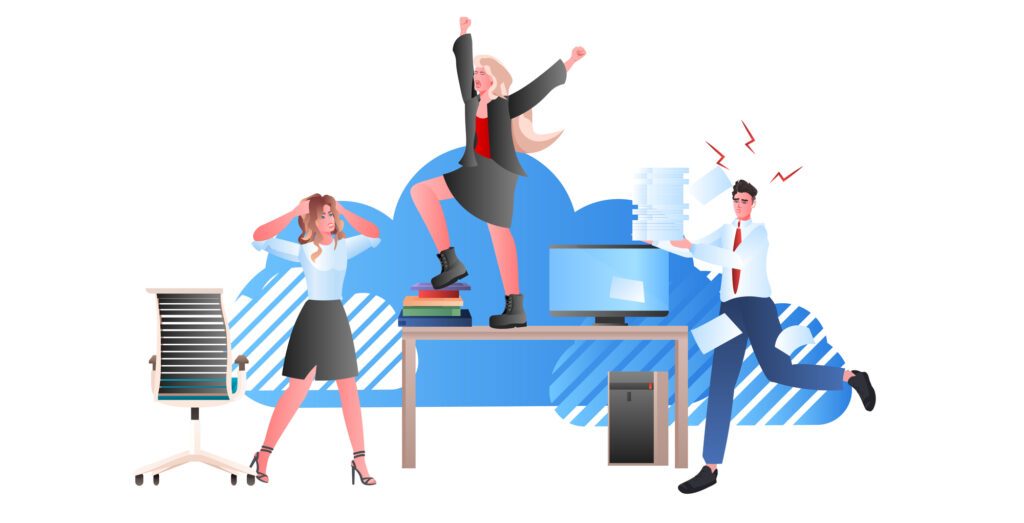 Whether it’s a loud conversation near the water cooler or the constant hum of machinery, most businesses deal with noisy work environments from time to time. While it may seem harmless, too much noise negatively affects productivity, concentration, and employee health. Avoiding noise distractions in the workplace will benefit workers and employers.
Whether it’s a loud conversation near the water cooler or the constant hum of machinery, most businesses deal with noisy work environments from time to time. While it may seem harmless, too much noise negatively affects productivity, concentration, and employee health. Avoiding noise distractions in the workplace will benefit workers and employers.
Potential Workplace Noise Distractions
Employees may be unable to concentrate with background noise that pulls them away from their work. Sudden or constant sounds can significantly impact their ability to do their job. Noise exposure can create stress, inattention, anxiety, and forgetfulness.
There are a few common workplace noise distractions everyone should look out for:
- Loud co-workers: Employee interactions are a great way to boost morale and engagement, but they can also be distracting. Loud conversations can even distract workers who aren’t included in the conversation.
- Noisy machines: Every team member uses office equipment or machines daily. While it’s a necessary part of the job, the constant noise can distract people from their work.
- Loud music: Ambient noise is nice, but it’s possible to have too much. Loud music is distracting, especially when constantly playing in the background.
While sometimes workers can’t avoid it, noisy work environments affect business operations. Employees’ safety may even be at risk if their roles require their full attention.
Everyone can even get distracted by noise when they’re trying to focus. Their brain searches for sound patterns even when concentrating on something else. Since the mind constantly tries to find connections, it will continually pull their attention away from their tasks toward distracting noises.
For example, a conversation in a nearby cubicle might be background noise until someone says a specific word. A worker’s brain may register it as familiar and direct them to pay attention, which can be a frustrating experience.
Effects of Noise in the Workplace
Noise can lower overall productivity and efficiency if it’s an ongoing issue. Beyond creating a stressful environment for employees, continuous exposure can also raise their blood pressure and cause heart disease. It may also contribute to hearing loss over time. Noisy work environments affect their health and limit employees’ ability to do their jobs.
How to Avoid Noise Distractions
Since it’s a serious matter, everyone should work together to reduce the effects of noise in the workplace. Even if offices can’t prevent it entirely, it’s possible to mitigate the effects. Either way, several changes help employees avoid noise distractions.
There are a few ways employers and employees can avoid noisy work environments:
- Employees can wear something that physically blocks the noise. Earplugs or noise-canceling headphones can protect an employee’s hearing and keep them on task. If it’s not an additional distraction, some headphones can play music of their choice.
- Higher-ups can intervene and create a quiet environment. Managers, bosses, and business owners should pay attention to how loud their space is and make changes if necessary. Direct intervention can be beneficial for everyone.
- Everyone can work when noise levels are at their lowest. Employees should take breaks to reduce distractions when they need to be deep in focus. Stepping away from the noise can reset their minds and maximize their productivity.
- The layout of the workplace can change to make up for a noisy environment. Room dividers, closed-door policies, and rugs can limit how far sound carries. Multiple or more significant changes are effective at reducing noise levels.
- Playing alternate noises can help employees ignore what is bothering them. Soft background noise may drown out distracting sounds. It works best when they’re constant.
While it’s not ideal, no one can prevent every distracting noise. Some machines are essential to keep a business functioning, and conversations between coworkers strengthen the team. However, everyone at a business can make small changes in their behavior or environment to keep the workplace quiet.
Alternative and Beneficial Noises
Some people cannot concentrate with background noise, but many find that certain sounds help them. Sounds named after colors have unique properties that can increase concentration and relaxation.
For example, white noise has a spectrum with equal power to any frequency interval. It provides the brain with a constant, unchanging pattern that won’t divide anyone’s attention. It aids concentration and drowns out other sounds.
Other colored noises, such as brown or pink noise, can increase productivity and efficiency. Anyone can play them in headphones or over speakers. While that would technically add to the amount of sound, it masks the distracting noises to improve concentration. It’s a simple alternative that may get the workplace back on track.
Solve Noisy Work Environments
A business can reduce or prevent the amount of noise in the workplace in plenty of ways. Plus, there are also alternative noises beneficial to employees. It’s best to implement multiple solutions to improve the work environment as much as possible. After all, a quiet workplace will make employees happier, healthier, and more productive.


